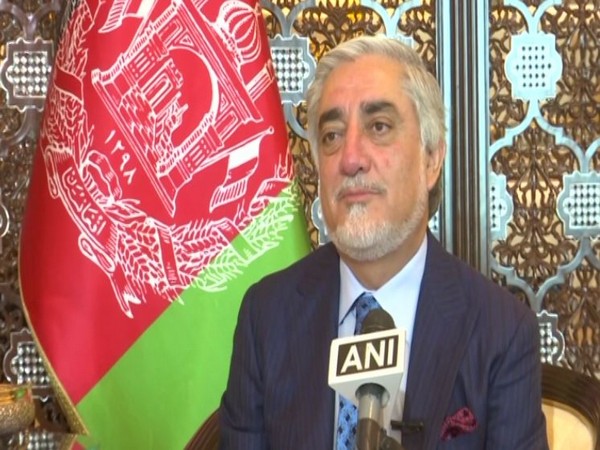No discussion over India's military role in Afghanistan during talks with Indian leadership: Abdullah Abdullah
Abdullah Abdullah, Chairman, High Council for National Reconciliation of Afghanistan on Saturday said he did not discuss the military role of India in Afghanistan during talks with Indian leadership over Afghan peace process.

- Country:
- India
Abdullah Abdullah, Chairman, High Council for National Reconciliation of Afghanistan on Saturday said he did not discuss the military role of India in Afghanistan during talks with Indian leadership over Afghan peace process. "No. Absolutely not. I did not raise that idea. The point is that we hope that Afghanistan will be able to stand on its own feet. As you know that US troops are the main part of it. They have withdrawn from Afghanistan. Still, they are present there but that will not be forever," Abdullah told ANI when asked whether he discussed any probable military role of India in Afghanistan.
The Afghan leader, who is on a five-day visit to India, said people of Afghanistan expect a settlement where no terrorist group will be able to work or use Afghan soil against any other country. "When we say peace, stability, we hold the whole context of it. It will not mean peace if we have an agreement only with the Taliban and then all the terrorist groups including Al Qaeda, ISIS from the region continue freelancing in Afghanistan. People of Afghanistan are expecting a settlement where no terrorist group will be able to work on or use Afghan soil against any other country. Peaceful Afghanistan, democratic Afghanistan, not harbouring terrorist this is the concerns of lots of countries of the region," he said on being asked about India's fear regarding Pakistan-backed terror groups, which has a direct influence on Taliban may hijack the Afghan peace process.
Abdullah said there will be a certain impact of foreign elements involved in the peace process. "There will be the certain impact of foreign elements in it. But when we eventually have the solution, which should be Afghan-led and Afghan-owned through Afghan-led and Afghan-owned negotiations. The influence of the foreign country will be needed, expected and anticipated," he said.
Abdullah said the premature withdrawal of US troops from Afghan soil will leave a vacuum in the country and will have an impact on the security situation. "Before the establishment of peace or progress in negotiations, if a premature withdrawal takes place, there is no doubt that it will leave a vacuum, which will have an impact on the security situation in Afghanistan. But it won't mean one side prevailing over another. We have realised that there is no solution through war," he said.
Asked about South Asian Association for Regional Cooperation's formula for resolving connectivity issues in the region, he said: "More connected the region is, the more we will benefit. It is not for us to decide for any country, that's the accepted fact. Through more connectivity in the region, all the countries will benefit." Abdullah said attacks along with peace talks might satisfy temporary expectations but it would not lead to a solution.
"If the calculation is based on the fact that if we continue the talks also we try to take advantage of the ground military, this may satisfy some temporary demands, desires but it will not lead to a solution. The solution is a firm commitment towards a peaceful settlement. Temporary advantages could be taken out of the situation but both will and determination of both sides will be tested throughout negotiations. Hope that both sides pass the test positively," he responded when asked whether the Taliban may take advantage of violent attacks in Afghanistan. On being asked about tensions between India and China, he said: "We think that any issue raised needs to be resolved amicably. Tensions between different countries have an adverse impact on us. We believe that any issue raising from time to time-resolved through relevant sides amicably. That is good."
On Thursday, he met Prime Minister Narendra Modi and National Security Advisor Ajit Doval wherein he reaffirmed the long-term commitment to further deepen India-Afghan ties. A day later, External Affairs Minister S Jaishankar met Dr Abdullah and assured him of India's commitment to peace, prosperity and stability in the neighbouring country.Abdullah's visit comes at a time when the Afghanistan government and Taliban are trying to negotiate a deal in order to restore peace in the country.
The peace talks between the Afghanistan government and the Taliban began on September 12 in Qatar's capital Doha. (ANI)
(This story has not been edited by Devdiscourse staff and is auto-generated from a syndicated feed.)
- READ MORE ON:
- Afghan
- Indian
- Narendra Modi
- Ajit Doval
- Abdullah
- Abdullah Abdullah
- S Jaishankar
ALSO READ
Indian stock markets shut for Eid celebrations
Indian students in Israel thank embassy for timely assistance, helping hand to fly home after Hamas attacks
PM Narendra Modi extends wishes to Maldives President Mohamed Muizzu on Eid
Indian secularism is intertwined in DNA of country's culture, it will not disappear so easily: Cong's Shashi Tharoor.
Billie Jean King Cup 2024: Indian women's tennis team beat Chinese Taipei 2-1










